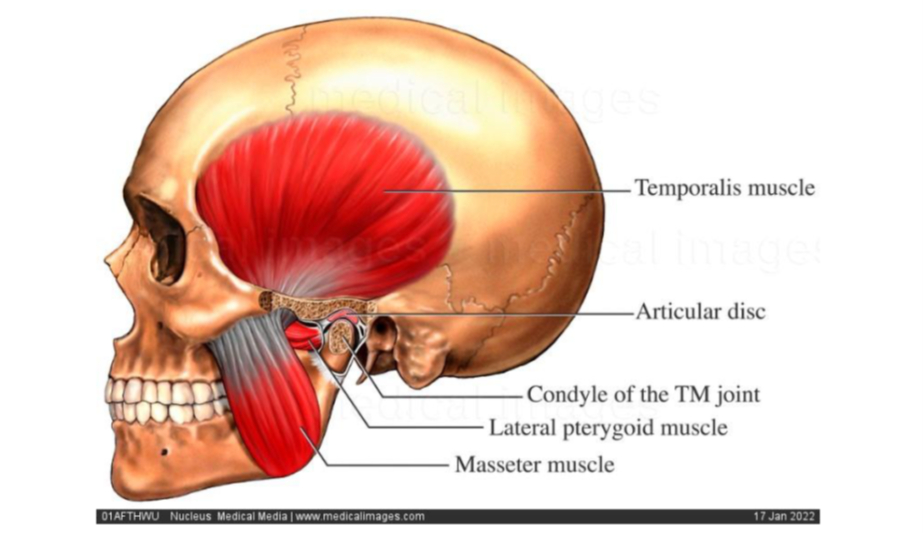What is TMJ (Temporomandibular Joint Disorder)?
TMJ, or Temporomandibular Joint Disorder, is a common condition that affects the jaw joint and surrounding muscles. It can cause pain and discomfort in the jaw, face, and neck, making it difficult for individuals to perform simple daily activities like eating and speaking. In this article, we will provide an informative and accessible overview of TMJ, focusing on its causes, symptoms, and how dry needling is an effective and well studied treatment option you should consider if you have TMJ.

What causes TMJ?
TMJ disorder can have multiple causes, including:
- Jaw injury: Trauma to the jaw joint or muscles can lead to TMJ disorder. This can occur due to accidents, sports injuries, or dental procedures.
- Teeth grinding (bruxism): Excessive clenching or grinding of teeth can strain the jaw joint and contribute to TMJ disorder.
- Arthritis: Certain forms of arthritis, such as rheumatoid arthritis or osteoarthritis, can affect the temporomandibular joint.
- Misalignment: An improper bite or misalignment of the teeth and jaw can put stress on the temporomandibular joint, leading to TMJ disorder.
- A commonly overlooked and poorly treated cause of TMJ is due to repetitive strain injures to the muscles that help us open and close our mouth. This leads to the development of triggerpoints which will cause pain that is often poorly treated with conventional treatment options but where Dry Needling really shines.
What muscles commonly cause or refer pain to the TMJ joint?
The 3 most common muscles with trigger points that refer pain to the TMJ joint are the masseter, lateral pterygoid, and the temporalis muscle. (Refer to the picture above to see where these muscles are).
What are the symptoms of TMJ?
The symptoms of TMJ disorder may vary from person to person, but commonly include:
- Jaw pain: This can range from mild discomfort to severe pain, often worsened by chewing or opening the mouth wide.
- Facial pain: Pain can be felt in the temples, cheeks, or around the ears, sometimes mistaken for a headache or earache.
- Jaw stiffness: Difficulty in opening or closing the mouth fully, or experiencing a “locked” jaw sensation.
- Clicking or popping sounds: Some individuals may notice clicking, popping, or grating sounds when they move their jaw.
- Headaches: Frequent headaches, especially in the temples or at the back of the head, can be associated with TMJ disorder.
What are the treatment options for TMJ?
The treatment options for TMJ disorder are aimed at relieving pain, improving jaw function, and reducing muscle tension.
These can include:
- Self-care measures: Applying heat or cold packs to the affected area, practicing stress reduction techniques, and avoiding hard or chewy foods.
- Medications: Over-the-counter pain relievers, nonsteroidal anti-inflammatory drugs (NSAIDs), and muscle relaxants may provide temporary relief.
- Physical therapy: Jaw exercises, stretching, and massage techniques can help improve jaw mobility and reduce muscle tension.
- Oral appliances: Dentists may prescribe oral splints or mouthguards to provide support to the jaw joint and alleviate symptoms.
- Invasive procedures: In severe cases, surgical intervention may be considered, such as arthrocentesis, arthroscopy, or open joint surgery.Dry Needling for TMJ
Dry Needling for TMJ
The good news is that the vast majority of TMJ pain can be successfully treated with Dry Needling.
A recent meta-analysis (PMID: 30146108) that looked at 7 studies on the effects of Dry Needling for TMJ disorder concluded that Dry Needling is better than other interventions for pain intensity as well as than sham therapy on pressure pain threshold.
Another recent study (PMID: 35208580) conculded that dry needling for tmj can reduce facial pain significantly and is accompanied by a notable reduction in muscle activity after needling its trigger points.
What is dry needling?
Dry needling is a technique that has gained recognition for its role in reducing myofascial muscular pain. It involves inserting thin needles into trigger points in the muscles, aiming to release tension, improve blood flow, and promote healing.
Let’s just quickly cover what myofascial pain is (if you want the one sentence summary it’s where your muscles cause pain and this is what causes 40-65% of all pain people experience).
Myofascial muscular pain is a common condition characterized by the presence of trigger points in muscles, which can cause localized pain and referred pain to other areas of the body. These trigger points are tight knots of muscle fibers that can be sensitive to touch and can restrict muscle movement. Understanding the nature of myofascial pain is crucial in developing effective treatment approaches.
The effectiveness and safety of dry needling have been supported by research studies. For example, a study published in the Journal of Manual & Manipulative Therapy found that dry needling effectively reduced pain and improved muscle function in patients with myofascial pain syndrome.
One of the key benefits of dry needling is its ability to target specific trigger points in the muscles, providing localized relief. By releasing tension and promoting muscle relaxation, it can help restore normal muscle function and alleviate pain. Additionally, dry needling has shown promise in improving range of motion, reducing muscle tightness, and enhancing overall musculoskeletal health.
Who does Dry Needling for TMJ Facial Pain in Tampa, FL?
It’s important that you find someone who has experience and education with dry needling. Did you know that there are 2 different types of dry needling needling providers?
There are acupuncturists who specialize in orthopedics (like me, Dr. Josh Hanson, DACM) who have 4+ years of schooling specific to using needles as a tool, who see 15-20 patients a day for years, who have performed 40,000+ procedures over the last 10 years. Who has consulted with all of the major sports teams in the region. Who only use needles (both dry needling & advanced regenerative injection procedures).
Then there are physical therapists who only take a very brief 52 hour weekend course. Who only have to learn to needle a few muscles and essentially just learn simple, general protocols. Who on average only use dry needling a couple of times a day.
Finding the right dry needling provider is very important to receiving a comprehensive and thorough treatment. You really need to do your homework so you get a proper treatment.
Dr. Hanson, DACM is one of the most experienced dry needling practitioners in the state of Florida and has treated hundreds of cases of TMJ Facial Pain with Dry needling. Feel free to call the office at 813-534-0311 to schedule a visit to help reduce your TMJ pain.


